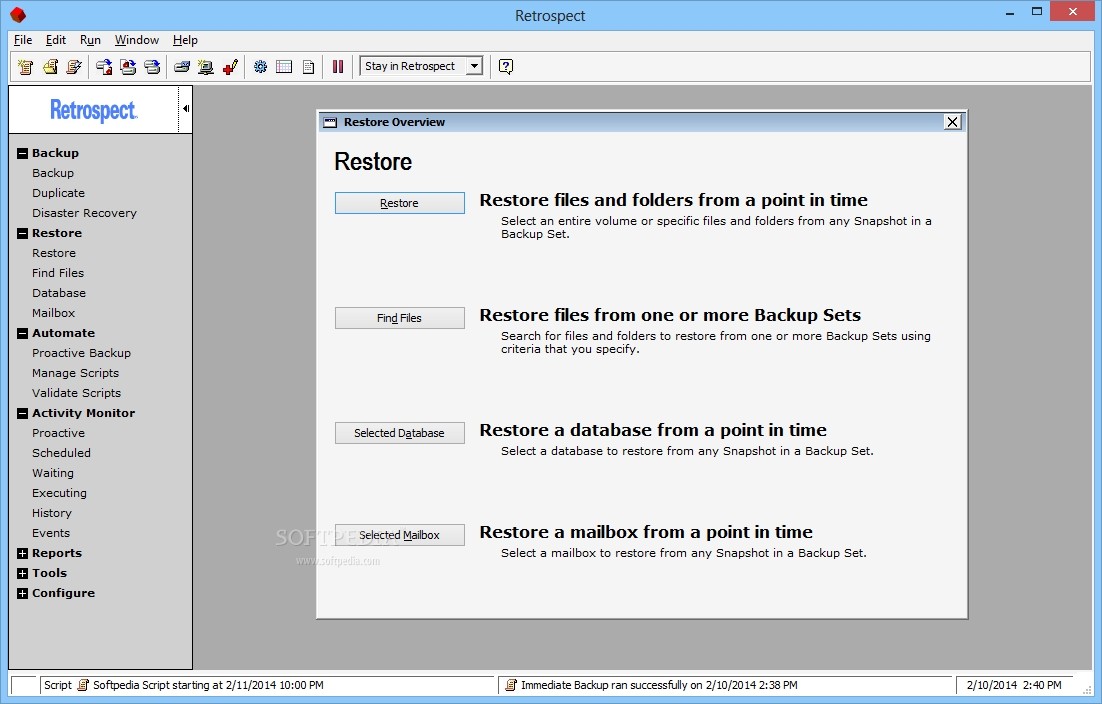

In addition, the study has identified certain areas of interest and opinion-making which can be considered as dissensus positions which identify often polar disagreement among panel members.
Reset retrospect client 7.7 password professional#
Consensus positions on: the roles and responsibilities of the stakeholders in science education indicators for a Canadian approach in science education which accounts for: the circumpolar position of Canada addressing the problematic situation of Canada’s indigenous peoples as underrepresented in the post-secondary and professional pathways of the sciences, and the desire for more inter-jurisdictional cooperation in science education within the constraints of provincial electoral cycles and constitutional control of education systems in Canada.Consensus on the principal goals for science education in Canada, including: Literacy in Science-Related Issues, Contributing to Human Health and Well-Being, Global Citizenship and Sustaining Earth’s Systems, and Life-Long Learning in a Technology-rich Society.New terminology – Sustainability Science, Technology, Economy and Environment (SSTEE) is presented as a principal, guiding foundation for science education in Canada the term provides historical continuity to the STSE movement which was a uniquely Canadian contribution to science education internationally and stands in opposition to the current trend of Science, Technology, Engineering and Mathematics (STEM).Consensus on a set of foundations for the science curriculum to 2030, which are: Science Education for Sustainability Science, Technology, Society, and the Environment Scientific Skills for the 21st Century, and the Nature of Science.Consensus on four significant national and international trends that are expected to have high impact of the future of Canadian science education namely: Science and Education for Sustainability, Developing Skills for the 21st Century, the Relevance of Science Education for Students, and Re-Conceptualizing the Purposes of Science Education.Guided by the research questions, the findings from this first-of-kind Delphi among leading Canadian science education specialists has identified the following positions deemed as consensus: Over a four-month period, an assembled expert panel of 54 peer-acknowledged and representative science education specialists from Canada - comprising fourteen identifiable professional affiliations in two cohorts - participated in a Delphi having three rounds. The form of policy Delphi adopted in this study is a variant of the classical Delphi group forecasting method which anticipates both consensus and dissensus positions.

The research was conducted and documented through an online, anonymous, and asynchronous modified policy Delphi methodology. The characterization and establishment of a logic of consensus on a Canadian approach to science education. Determine and describe the theoretical foundations, goals, and objectives for the science curriculum in Canada. Define and describe system conditions that will initiate and influence future development of science curriculum in Canada. The study included the following sub-objectives: 1. The objective of this dissertation was to empirically determine, and provide definition to, the principal theoretical foundations and system conditions for a Canadian approach to science education. Though contested, it will be argued here and supported by the research that the Canadian systems of science education operating in the provinces and territories have not had opportunity, historically, to engage in curriculum uniquely from Canada that supplies broad and respected appeal to the context of Canadian society, its demographics, its geographic diversity, and its geo-political position internationally. Despite episodes of identifiably Canadian influences on science education, the last six decades of science education in Canada has been a decidedly American experience – particularly from the standpoints of: 1) the foundational policy documents that have provided explicit impetus to periodic science curriculum reform in Canada 2) the principal theoretical foundations, guiding assumptions, and goals of science education, and 3) the development of curricular frameworks in Canadian provincial jurisdictions.


 0 kommentar(er)
0 kommentar(er)
